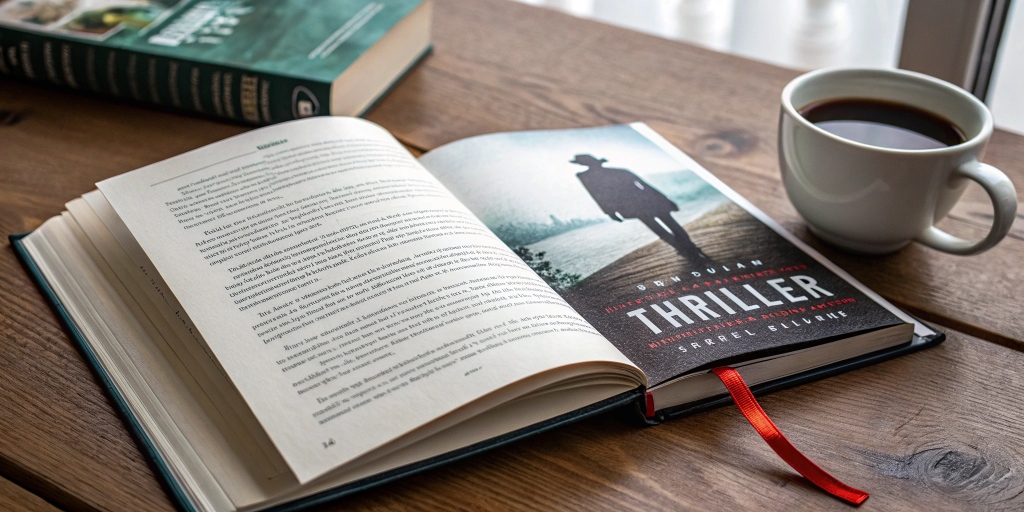What Are Thriller Novels?
Thriller novels occupy a fascinating corner within the world of literature, blending exhilarating suspense with intricate storytelling. While the genre often focuses on crime, psychological mysteries, and high-stakes chases, its heartbeat is the relentless drive to keep readers on the edge of their seats. Authors employ a mixture of tension, plot twists, and complex characters to create a literary rollercoaster. Many readers discover that even offshoots like children’s fiction fantasy books weave suspense and adventure together, offering young minds stories that stimulate curiosity and the imagination. These books foster early engagement with critical and creative thinking by encouraging children not only to follow a narrative but to question the motivations and secrets hidden within it.
Part of what differentiates thrillers from other genres is their intricate plotting and psychological tension, which challenge the reader to anticipate outcomes and stay alert for hidden clues. These elements are fundamental, regardless of whether a story unfolds in an urban setting, a remote village, or even a fantastical realm. The core of the genre remains the battle of wits between not only the protagonist and the antagonist but also between the author and the reader. The reader is continually lured into guessing, reassessing, and questioning, promoting a rich cognitive engagement that adds to the genre’s allure.
Why Readers Love the Thriller
The pull of thrillers goes far beyond basic entertainment; it taps into deep psychological needs shared across cultures and generations. Scientists have found that the brain is wired to seek novelty and to experience suspense. When immersed in thrillers, the mind responds by releasing chemicals such as dopamine and adrenaline, which enhance alertness and heighten emotions. This intensifies the immersion, transforming the act of reading into an emotionally charged experience. Readers come to care about the dilemmas facing the hero or heroine, often feeling genuine anxiety, hope, and relief as the plot unfolds. The feeling of tension and eventual catharsis is particularly satisfying because it’s experienced within the safe confines of fiction.
Many enthusiasts cite the safe exploration of danger as a main reason for their love of the genre. Thriller novels enable exploration of scenarios filled with uncertainty, risk, and fear without the real-world risks. As neuroscientists report, such “safe scares” can actually contribute to a person’s well-being by providing an adrenaline rush in a controlled environment. Readers practice handling anxiety and complex problem-solving, training their minds to cope with real-world stressors more effectively. The genre’s enduring popularity is proof of its power to captivate and offer readers a uniquely thrilling outlet.
Developing Critical Thinking Skills
Thriller novels do much more than entertain—they sharpen critical thinking skills in subtle but powerful ways. Unraveling a tightly woven plot involves analyzing evidence, making inferences, identifying red herrings, and remaining skeptical of surface-level explanations. Readers are required to build mental maps of clues, timelines, and relationships, actively piecing together information that might not be explicitly stated. The genre invites its audience to question everything: Is this character trustworthy? Does this event make sense within the broader context of the plot? In this sense, every thriller is a mental workout, promoting habits of skepticism, analysis, and deduction that are useful far beyond literature.
Studies support the connection between fiction and cognitive growth. According to a Psychology Today article on the benefits of reading fiction, readers who engage in complex novels enrich their reasoning abilities, creative thinking, and capacity for nuanced judgment. As they wrestle with morally ambiguous decisions, unreliable narrators, and open-ended conclusions, readers exercise the “mental muscles” that underpin effective problem-solving and decision-making in everyday life.
Empathy in Thriller Literature
Thrillers are not just exercises in logic and reasoning—they are also profound vehicles for building empathy. Great thriller authors create multidimensional protagonists and antagonists, often wrestling with fears, ambitions, and ethical dilemmas that mirror real-life complexity. By presenting characters with relatable vulnerabilities, the genre enables readers to step into other people’s shoes, grapple with unfamiliar emotions, and understand perspectives quite different from their own.
Scientific research consistently shows that reading well-crafted fiction boosts our ability to comprehend others’ thoughts and emotions. When readers experience nail-biting tension, heartbreak, or redemption alongside a character, they naturally build their own capacity for compassion. These books challenge us to understand not only familiar motivations but also the misunderstood, the wounded, and even the villainous. This empathetic exercise is invaluable for developing social intelligence and kindness, skills that spill over into real-world relationships and interactions.
How Authors Craft Suspense
Constructing suspense requires a careful blend of art and science. The suspense novelist is a master of pacing, controlling the revelation of information to manipulate the reader’s emotional state. By layering plots with false leads, dramatic pauses, and rapid shifts in perspective, authors create an ongoing dance between expectation and surprise. Cliffhangers—sudden interruptions at the end of a chapter or scene—compel the reader to continue, hungry for resolution.
Details and setting are equally important. The best thrillers use sensory cues—creaking floors, dimly lit rooms, unexplained shadows—to stimulate the imagination and keep the reader guessing. Dialogue and internal monologue often raise more questions than they answer, encouraging readers to scrutinize every word. This immersive experience transforms readers into amateur detectives, analyzing every element for hidden meaning and significance.
Famous Examples and Their Influence
Some of literature’s most famous novels belong to the thriller genre. Classics such as Agatha Christie’s “Murder on the Orient Express” and contemporary blockbusters like Gillian Flynn’s “Gone Girl” have not only entertained millions but shaped storytelling itself. Their creative plots, psychologically rich characters, and ability to subvert expectations have set new standards for literary excellence. The ripple effect is visible in countless adaptations—films, television shows, and digital series continue to draw heavily from the conventions and innovations introduced by these novels.
Beyond pop culture, thrillers encourage thoughtful conversations about morality, justice, and the human condition. They invite readers to wrestle with questions of guilt, accountability, redemption, and personal transformation, often sparking debate both online and offline. Their lasting impact is a testament to the genre’s versatility and ability to resonate with readers of all backgrounds.
The Role of Thrillers in Modern Culture
The modern thriller is as dynamic as the world it mirrors. Digital publishing and a more inclusive literary landscape have made it possible for new voices to contribute fresh perspectives to the genre. Readers now have access to an endless array of stories from diverse authors around the globe, each putting a unique spin on suspense and intrigue.
Online communities, book clubs, podcasts, and streaming adaptations offer readers additional ways to engage, discuss, and dissect their favorite works. The genre keeps evolving, often reflecting contemporary fears, social dynamics, and technological breakthroughs. Whether the mystery involves classic detective work or cybercrime, the heart of the thriller remains the challenge it presents to the reader—both as a puzzle, and as an exploration of the human spirit.











+ There are no comments
Add yours